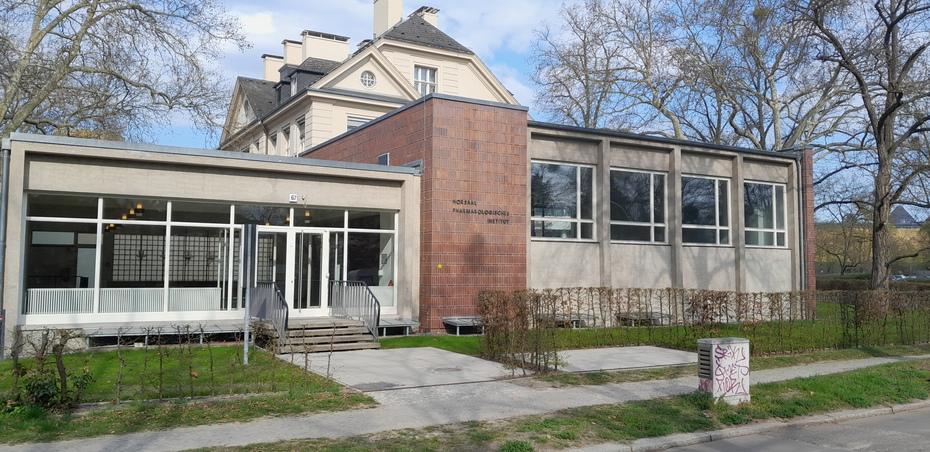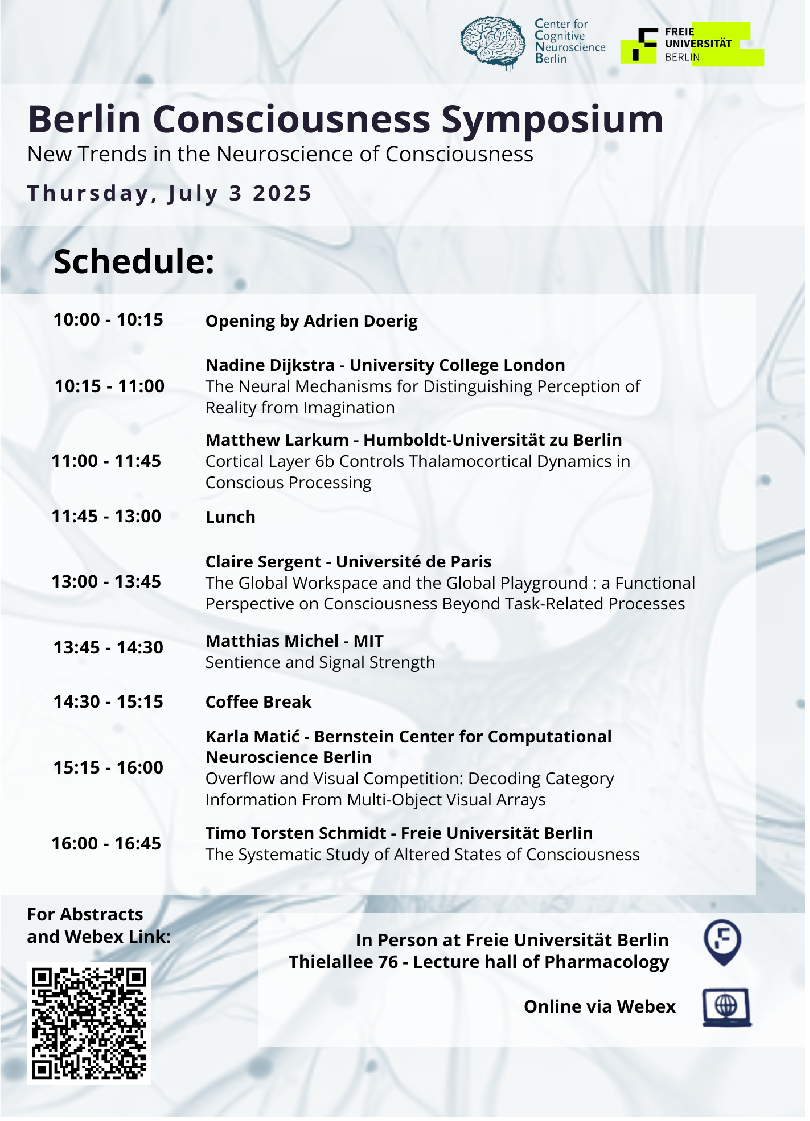Berlin Consciousness Symposium: New Trends in the Neuroscience of Consciousness
One-day symposium at Freie Universität (+ Social Event of CCNB)
Consciousness remains one of the most challenging open questions in science. The 1990s and 2000s saw a surge in empirical and theoretical work, leading to the rapid development of competing Theories of Consciousness. While this period was marked by enthusiasm and innovation, recent years have brought a sense of stagnation: despite ongoing efforts, there is still no consensus regarding which theories are best supported by empirical evidence, or how to reconcile their often divergent assumptions and predictions. The Berlin Consciousness Symposium brings together leading cognitive scientists and philosophers to take stock of these developments and explore new trends that may shape the future of consciousness science.
LOCATION: Thielallee 67
You can use the following google.maps to find the building: https://maps.app.goo.gl/5HJ5PwMBpetSG8kP8
This is how the building looks like:

(NOTE: There was a unfortunate number twister in the address communicated on the poster. It is Thielallee 67 instead of 76)
NO REGISTRATION NECESSARY
There will be coffee in the morning and in the coffee breaks - Please bring your own cup! (for sustainability)

Online Participation (Webex) Session 1: https://fu-berlin.webex.com/fu-berlin-en/j.php?MTID=mdb981bc3c0fc2d9dac4685a86f6e15cc
Nadine Dijkstra University College London
Title: The neural mechanisms for distinguishing perception of reality from imagination
Abstract: Our conscious experiences can arise from the world around us—or from within our own minds. Cognitive neuroimaging shows that imagining and perceiving rely on the same brain networks. So how does the brain avoid confusing imagination for reality and vice versa? In this talk, I’ll share our latest research on how the brain decides whether what we “see” is real or imagined.
Matthew Larkum, Humboldt Universität zu Berlin
Title: Cortical layer 6b controls thalamocortical dynamics in conscious processing
Abstract: Dendritic Integration Theory (DIT) posits that cellular-level computations are fundamental to consciousness. This talk will highlight our recent discoveries on the overlooked cortical layer 6b (L6b), detailing its unique cortico-cortical inputs and specific projections to layer 5 pyramidal dendrites and associated higher-order thalamic nuclei. We propose L6b acts as a critical modulator of thalamocortical interactions, gating information flow essential for conscious experience, consistent with DIT principles. Intriguing in vivo data from manipulating L6b activity will demonstrate its profound influence on cortical state, offering new perspectives on the cellular mechanisms of consciousness.
Online Participation (Webex) Session 2: https://fu-berlin.webex.com/fu-berlin-en/j.php?MTID=m1224f80ccbf71450e5c02a6adac2458d
Claire Sergent, Université de Paris
Title: The global workspace and the global playground : a functional perspective on consciousness beyond task-related processes
Abstract: Most of what we know about the differences between conscious and non-conscious processing in the brain rely on studies where participants perform some form of sensory task. Research is now moving forward by exploring conscious processing beyond this framework and asking the question : are there core mechanisms that are common to becoming conscious of a content, irrespective of the type of content, irrespective of whether we are performing a task on it or not ? I will present some experimental work that we are currently conducting on this topic, and will propose some update of the global workspace model of consciousness that embraces this widening in the investigation scope.
Matthias Michel, Massachusetts Institute of Technology
Title: Sentience and Signal Strength
Abstract: The question of which mental functions require consciousness has recently come to the forefront because of its relevance for investigating animal consciousness. Finding out that an animal can perform a function associated with consciousness would count as evidence that it has conscious states. I argue that most of the empirical research interpreted as showing that some functions are associated with consciousness does not actually show this. Instead, it merely shows that the relevant functions falter when based on degraded sensory signals, which is trivial. For this reason, the presence of functions supposedly associated with consciousness in non-human animals should not convince the skeptics one bit.
Online Participation (Webex) Session 3: https://fu-berlin.webex.com/fu-berlin-en/j.php?MTID=m07dc4739d1a7e47c7920d77bff981607
Karla Matić, Bernstein Center for Computational Neuroscience Berlin
Title: Overflow and Visual Competition: Decoding Category Information From Multi-Object Visual Arrays
Abstract: How much do we see in a blink of an eye? The capacity of visual perception and whether consciousness “overflows” cognition has long been debated in consciousness science. In this talk, I will discuss a hypothesis that limited visual capacity arises as a direct consequence of visual competition: when multiple objects are presented simultaneously, they may compete for access to consciousness due to interference at high-level stages of processing where neurons have large receptive fields. I will present an fMRI study in which we examine the extent to which competition between multiple presented objects influences encoding of category information, and discuss how visual competition influences the type and localization of object representations in the brain. I will use the findings of this study to suggest a potential mechanism for how object representations are “shielded” from competitive interactions in cluttered arrays, and discuss the implications of our findings for the overflow argument and estimating the capacity of conscious vision.
Timo Torsten Schmidt, Freie Universität Berlin
Title: The systematic study of Altered States of Consciousness
Abstract: In this talk I will describe how the study of Altered States of Consciousness (ASCs) can contribute to the identification of meaningful Neural Correlates of Consciousness (NCCs). I will provide an overview of the current state of this research field with a focus on quantitative phenomenologic and neurophysiologic research. Together, these form the foundation for the identification of NCC for phenomena such as hallucinations. I will discuss the idea of "core features" of ASCs and will explain how these are relevant in the philosophy of mind as well as for clinical research.